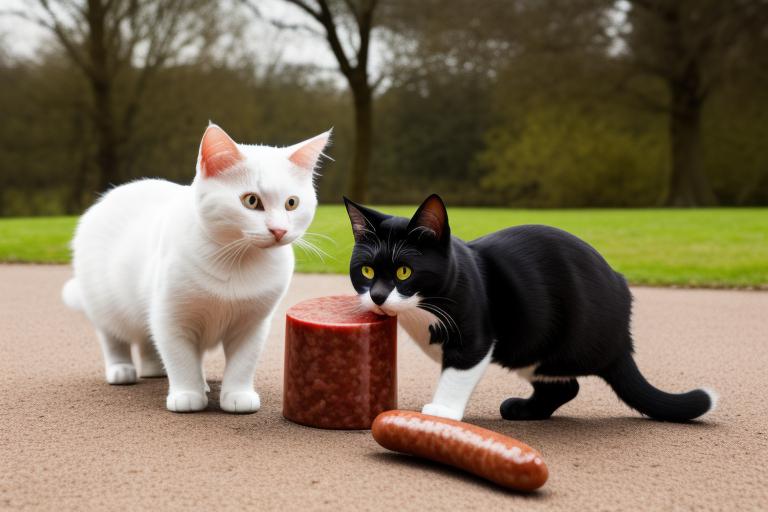Did you know that not all human food is safe for cats? While it may be tempting to share your delicious sausage breakfast with your feline friend, it’s important to consider the potential risks involved.
Cats have specific dietary needs, and certain ingredients commonly found in sausage can be harmful to them. But what exactly are these risks, and are there any safe alternatives?
In this discussion, we’ll explore whether cats can eat sausage and shed light on the health implications of doing so. So, before you reach for that sausage link, let’s uncover the facts and make sure you’re making the best decisions for your furry companion.
Potential Health Risks of Feeding Sausage to Cats
Feeding sausage to your cat can pose potential health risks that you should be aware of. While cats may be attracted to the smell and taste of sausage, it’s important to understand that it isn’t an ideal food for them.
One of the main concerns is the high fat content in sausages. Cats have a low tolerance for fat, and consuming too much can lead to pancreatitis, a painful and potentially life-threatening condition.
In addition, sausages often contain seasonings and spices, such as garlic and onion, which are toxic to cats. These ingredients can cause gastrointestinal upset, anemia, and even damage to their red blood cells.
Furthermore, the high salt content in sausages can lead to dehydration and kidney problems in cats.
It’s crucial to remember that cats have specific dietary needs and should primarily be fed a balanced diet of cat food that provides them with the necessary nutrients.
If you’re considering offering sausage as a treat, it’s best to consult with your veterinarian to ensure it’s safe for your cat and to determine appropriate portion sizes.
Nutritional Value of Sausage for Cats

While sausage may be tempting to offer your cat, it’s important to understand the nutritional value it provides. Sausage is typically high in fat, sodium, and spices, which aren’t beneficial for your cat’s health. Cats have specific dietary requirements that differ from ours, and feeding them sausage can lead to various health problems.
One of the main concerns with feeding sausage to cats is its high fat content. Cats require a diet that’s moderate in fat, as excessive fat intake can lead to obesity and other related issues. Additionally, sausage often contains a high amount of sodium, which can be harmful to cats. High sodium levels can cause dehydration and put strain on your cat’s kidneys.
Another factor to consider is the presence of spices in sausage. Many sausages contain spices such as garlic and onion, which are toxic to cats. Even small amounts of these spices can cause gastrointestinal upset and damage to your cat’s red blood cells.
In terms of nutritional value, sausage lacks the essential nutrients that cats need to thrive. It doesn’t provide the necessary vitamins, minerals, and proteins that are crucial for their overall health and well-being.
Therefore, it’s best to avoid feeding sausage to your cat and instead opt for a balanced and species-appropriate diet that meets their specific nutritional needs. Consulting with a veterinarian can help you determine the best diet for your feline friend.
Common Ingredients in Sausage That Can Harm Cats
Some common ingredients found in sausage can be harmful to cats. While it may be tempting to share your delicious sausage with your feline friend, it’s important to be aware of the potential dangers.
Sausage often contains high levels of sodium, which can lead to dehydration and kidney problems in cats.
Additionally, many sausages are seasoned with spices like onion and garlic, both of which are toxic to cats. These ingredients can cause gastrointestinal upset, anemia, and even damage to the red blood cells.
Cats are also unable to metabolize certain fats found in sausage, which can lead to pancreatitis, a painful inflammation of the pancreas.
Furthermore, some sausages may contain preservatives like nitrates and nitrites, which have been linked to an increased risk of cancer in cats.
It’s important to remember that cats have specific dietary needs and their bodies aren’t designed to process certain ingredients found in human food. While an occasional small bite of sausage may not cause harm, it’s best to avoid feeding it to your cat altogether to ensure their health and well-being.
Signs of Sausage Allergy in Cats
If your cat is allergic to sausage, there are certain signs you should watch out for. Allergies can cause discomfort and health issues for your feline friend, so it’s important to be aware of the symptoms.
Here are three signs that may indicate your cat is allergic to sausage:
- Digestive Issues: One of the most common signs of a sausage allergy in cats is digestive problems. You may notice your cat experiencing vomiting, diarrhea, or constipation after consuming sausage. These symptoms can be mild or severe, depending on the severity of the allergy.
- Skin Reactions: Another sign of a sausage allergy is skin reactions. Your cat may develop redness, itchiness, or rashes on their skin after being exposed to sausage. They may also excessively groom or scratch the affected area, leading to hair loss or sores.
- Respiratory Problems: Cats with a sausage allergy may experience respiratory issues. They may sneeze, cough, or have difficulty breathing after eating sausage. In more severe cases, they may even develop asthma-like symptoms, such as wheezing or shortness of breath.
If you notice any of these signs in your cat after they consume sausage, it’s important to consult with your veterinarian. They can help determine if your cat is indeed allergic to sausage and recommend the appropriate treatment or dietary changes.
Alternatives to Sausage for Treating Your Cat
Consider incorporating other protein-rich and cat-friendly options into your cat’s diet as alternatives to sausage. While sausage may be tempting to share with your feline friend, it’s important to remember that certain ingredients, such as spices, can be harmful to cats. Instead, opt for safer alternatives that will still provide your cat with the nutrients they need.
One option is to offer your cat small pieces of cooked chicken or turkey. These lean meats are high in protein and can be a delicious treat for your cat. Just make sure to remove the skin and bones before serving it to them.
Fish is another great alternative to sausage. Cats are known for their love of fish, and it can be a healthy addition to their diet. However, it’s important to ensure that the fish is cooked thoroughly and free from any seasonings or additives that may be harmful to your cat.
If your cat has a sensitive stomach or is on a restricted diet, you can consider giving them commercially available cat treats or wet food that are specifically formulated for their dietary needs. These options are often made with high-quality proteins that are safe and beneficial for your cat.
Frequently Asked Questions
Yes, cats can eat raw sausage, but it’s not recommended. Raw sausage may contain harmful bacteria that can make your cat sick. It’s safer to stick to cooked meat for your feline friend.
When feeding your cat sausage, it’s important to take precautions. Make sure the sausage is fully cooked and doesn’t contain any spices, onions, or garlic. Also, feed it in moderation to avoid digestive issues.
You can safely give your cat a small amount of sausage as a treat occasionally. However, it’s important to avoid giving them too much as it can upset their stomach and potentially lead to pancreatitis.
Cats can develop addictions to certain foods, including sausage. It’s important to remember that cats have specific dietary needs, and too much sausage can lead to health issues.
There are certain types of sausages that are safe for cats to consume, but it’s important to check the ingredients first. Avoid sausages that contain garlic, onion, or other toxic ingredients.
Conclusion
In conclusion, it isn’t recommended to feed sausage to cats due to the potential health risks and harmful ingredients it may contain. Sausage can cause digestive issues, allergies, and even more serious complications in cats.
It’s important to prioritize your cat’s health and provide them with appropriate, nutritionally balanced meals. There are plenty of alternative, cat-friendly options available to treat your furry friend.

